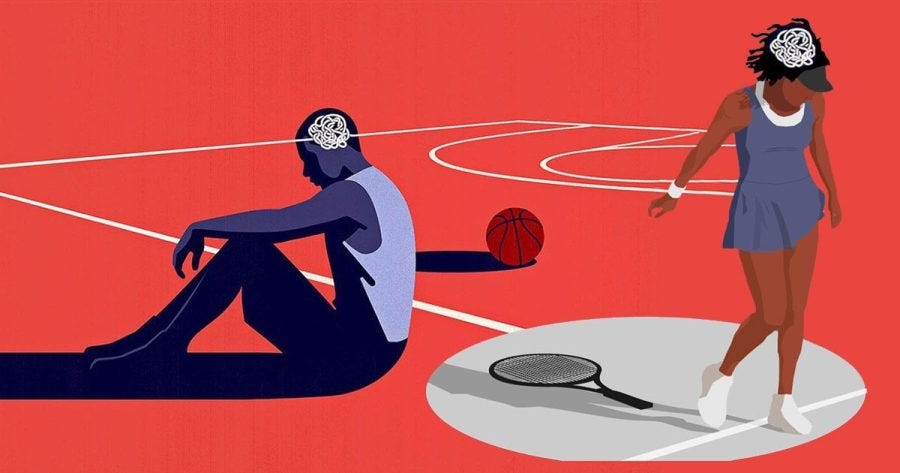Participating in sports goes far beyond physical fitness; it can have a profound impact on our mental well-being. Studies have shown that engaging in physical activity, such as sports, can help moderate stress, improve mood, and enhance mental clarity. The connection between sports and mental health is a powerful one, and understanding its benefits is crucial for promoting holistic wellness and resilience.
From boosting endorphin levels to reducing cortisol, the physiological effects of sport can have a transformative impact on our mental state. Furthermore, the social aspects of team sports can foster a sense of community and belonging, which are essential for maintaining positive mental health. Whether you’re an elite athlete or a casual player, the mental health benefits of sports are undeniable.
Sports as a Stress Buster
Participating in sport have a profound impact on stress levels. When we engage in physical activity, our bodies release endorphins, the natural chemicals that not only relieve pain but also reduce feelings of stress and anxiety. Studies have shown that just 20-30 minutes of exercise per day can make people feel calmer, with the effects lasting for several hours after the activity.
Endorphin Release and Cortisol Reduction
Sport also help lower levels of cortisol, a hormone commonly associated with stress. Cortisol is the body’s primary stress hormone, and elevated levels can lead to a range of negative health effects, including impaired cognitive function, weakened immune system, and even weight gain. By engaging in sports, individuals can effectively manage their stress levels and enjoy the long-lasting benefits of stress relief, endorphin release, and cortisol reduction.
The stress-busting benefits of sport can have a significant impact on overall mental health. By providing an outlet for physical and mental release, sports can help individuals cope with the demands of daily life, leading to improved mood, increased focus, and a greater sense of well-being. Whether it’s a daily jog, a team sport, or a challenging workout, incorporating sports into one’s lifestyle can be a powerful tool in managing stress and improving mental health.
Mood Enhancement and Mental Clarity
Beyond reducing stress, engaging in sports can also enhance mood and improve mental clarity. The focused attention required to participate in a sport helps individuals set aside their worries and concentrate on the task at hand, which can have a calming effect and contribute to better sleep. Additionally, the social aspects of team sports can foster a sense of belonging and community, further boosting mood and emotional well-being.
Studies have found that individuals who participate in group sports tend to experience greater mood improvements compared to those who exercise alone. The camaraderie and social interactions that come with team sports not only enhance mood but also promote mental clarity and emotional well-being.
The release of endorphins during physical activity is another key factor in the mood-enhancing benefits of sport. These “feel-good” chemicals help alleviate feelings of depression and anxiety, leading to a more positive overall mental state. The mood enhancement and mental clarity gained through sports can be particularly beneficial for individuals facing challenges in their mental health.

“Exercise has been shown to improve mood in people with mild to moderate depression. It may work as well as antidepressant medication, without the side effects.”
Long-Term Mental Health Benefits
Engaging in sports doesn’t just provide immediate stress relief and mood enhancement; it can also have lasting positive impacts on mental health. A growing body of research suggests that participating in sports, particularly during childhood and adolescence, can cultivate skills, social connections, and a sense of accomplishment that foster lifelong mental resilience and well-being.
A comprehensive study of over 9,600 children found that those who were involved in team sports during their youth had better mental health outcomes as adults, even if they had experienced adverse childhood experiences. This underscores the profound and long-term mental health benefits of sports and mental well-being.
The lifelong impact of sports on mental health can be attributed to several key factors:
- Development of coping mechanisms and problem-solving skills
- Fostering a sense of belonging and social support through team dynamics
- Experiencing the satisfaction and pride that comes with achieving personal and collective goals
- Establishing healthy habits and routines that promote overall well-being
These benefits cultivated during one’s youth can have a profound and lasting influence on mental health, helping individuals navigate the challenges of adulthood with greater resilience and emotional well-being. Investing in sports and physical activity at an early age can truly be a transformative experience with long-term mental health benefits.
“Sport have the power to not only improve physical health but also profoundly shape an individual’s mental well-being for years to come.”
How Sports Impact Mental Health
Boosting Mental Health with Team Sports
While sport in general have been shown to benefit mental health, research indicates that participation in team sports may provide even greater mental health advantages compared to individual sports. A study in Australia found that women who played team sports like tennis and netball had better mental health than those who exercised alone, such as walking or working out at the gym. Similarly, a study of teenage athletes found that those who participated in individual sports were more likely to report experiencing anxiety and depression, potentially due to the lack of social interaction and team camaraderie. These findings suggest that the social and collaborative nature of team sports can be particularly beneficial for mental health.
The benefits of group sport go beyond just physical fitness. Engaging in team sports can foster a sense of belonging, improve communication skills, and provide a supportive network of peers. This social interaction and shared experience can have a profound impact on an individual’s mental well-being, helping to alleviate feelings of isolation and depression.
“The social and collaborative nature of team sports can be particularly beneficial for mental health.”
In contrast, individual sports may not offer the same level of social support and camaraderie, which can be crucial for maintaining good mental health. While individual sport can still provide physical and mental benefits, the lack of team-based interaction may limit their effectiveness in addressing certain mental health concerns.

Ultimately, the research suggests that incorporating team sports into one’s lifestyle can be a powerful tool for boosting mental health and promoting overall well-being. By fostering a sense of community and providing opportunities for social interaction, team sport can be a valuable complement to other mental health interventions and strategies.
Sports as a Tool to Combat Addiction
Beyond the direct mental health benefits of sports participation, emerging research suggests that sports can serve as a powerful tool in the fight against addiction. A growing body of evidence highlights the potential of sports to help individuals overcome substance abuse and other addictive behaviors.
A study conducted in Norway found that teenagers who engaged in team sports were less likely to smoke cigarettes or use cannabis as adults. Researchers in Korea have also recommended the use of sports as a means to help teenagers combat internet addiction. The social connections, sense of purpose, and healthy lifestyle fostered through sports participation may provide a protective factor against the development of addictive behaviors.
The positive impact of sport on mental health is well-documented, with activities like exercise and team-based play known to boost mood, reduce stress, and promote overall well-being. These benefits may be particularly impactful for individuals struggling with addiction, as they can provide a constructive outlet and a sense of community during the recovery process.
By incorporating sports and physical activity into addiction treatment and prevention programs, healthcare providers and community organizations can leverage the power of play to support individuals on their journey to recovery. Whether it’s joining a recreational league, participating in outdoor activities, or engaging in individual fitness pursuits, the transformative impact of sports can be a valuable tool in the fight against addiction.
“Sports have the power to not only improve physical health, but also to positively impact mental well-being and provide a meaningful path to addiction recovery.”
As the research continues to unveil the multifaceted benefits of sports, healthcare professionals, policymakers, and community leaders are increasingly recognizing the potential of this holistic approach to addiction recovery and prevention. By leveraging the power of play, we can empower individuals to overcome the challenges of addiction and reclaim their mental and physical well-being.
Alleviating Depression and Anxiety
Numerous studies have demonstrated the remarkable impact of sports and exercise in alleviating the symptoms of depression and anxiety. Exercise has been found to be as effective as standard antidepressant treatment in some cases, with even modest amounts of physical activity helping to improve depressive symptoms. Participation in sports has also been linked to a reduced risk of relapse for those experiencing depression.
For individuals with serious mental health conditions like schizophrenia, exercise can help improve certain symptoms, such as loss of motivation and thinking difficulties. The endorphin release and cortisol reduction triggered by physical activity can have a profound effect on mood, providing a natural boost to mental well-being.
The benefits of sports and exercise for mental health are multifaceted. Team sports, in particular, can foster a sense of community and belonging, which is crucial for individuals struggling with depression or anxiety. The social interactions and camaraderie found in team sports can help alleviate feelings of isolation and provide a supportive network.
| Benefits of Sports for Mental Health | Evidence |
|---|---|
| Reduced risk of depression relapse | Studies show that regular exercise can lower the risk of relapse in people with depression by up to 50%. |
| Improved symptoms of schizophrenia | Exercise has been found to improve symptoms such as lack of motivation and cognitive difficulties in individuals with schizophrenia. |
| Increased endorphin release | Physical activity triggers the release of endorphins, which can improve mood and reduce stress and anxiety. |
Incorporating sports and exercise into a comprehensive mental health treatment plan can be a powerful tool in the fight against depression and anxiety. By harnessing the body’s natural mechanisms and the social benefits of team activities, individuals can find effective and sustainable ways to improve their overall well-being.
“Exercise is the single best thing you can do for your mental health.”
Elite Athletes and Mental Health Challenges
While sport can offer significant mental health benefits, elite athletes often face unique challenges. The intense physical and mental demands placed on these exceptional individuals can sometimes lead to heightened stress, burnout, and even depression. Factors such as injury, retirement from the sport, and high performance expectations can heighten the risk of mental health issues among elite athletes.
Research has revealed that elite athletes may experience higher levels of psychological distress compared to the general population. This underscores the critical importance of addressing the specific mental health needs of these athletes to support their overall well-being and long-term success. By recognizing and addressing the unique mental health considerations faced by elite athletes, we can ensure they have the resources and support to thrive both on and off the field.
As we continue to explore the intersection of sport and mental health, it is essential to shine a light on the experiences of elite athletes. By understanding the challenges they face and providing appropriate interventions, we can foster a culture that prioritizes the holistic well-being of these extraordinary individuals who dedicate their lives to their craft.












